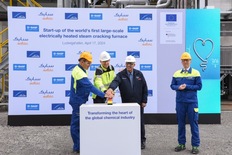- The project received €14.8 million from the German Federal Ministry for Economic Affairs and Climate Action.
- The demonstration plant aims to reduce CO2 emissions by 90% using renewable electricity.
- The plant processes 4 tons of hydrocarbon feedstock per hour and consumes 6 megawatts of renewable energy.
- Two heating concepts are tested: direct electric current and indirect radiative heat.

Project Overview
BASF, SABIC, and Linde have inaugurated the world’s first large-scale electrically heated steam cracking furnace at BASF’s Verbund site in Ludwigshafen, Germany. This follows three years of development, engineering, and construction work. The project aims to demonstrate the feasibility of using electricity as a heat source for steam cracking, a process central to the production of basic chemicals.
Technological Innovation
Steam crackers typically operate at around 850 degrees Celsius, using conventional fuels. The new demonstration plant seeks to achieve these temperatures using renewable electricity, potentially reducing CO2 emissions by at least 90% compared to traditional methods. The plant is integrated into the existing steam crackers at Ludwigshafen and will produce olefins such as ethylene and propylene from hydrocarbon feedstock.
Operational Details
The plant features two separate demonstration furnaces testing different heating concepts: direct heating, which applies an electric current directly to the cracking coils, and indirect heating, which uses radiative heat from elements placed around the coils. Together, these furnaces process around 4 tons of hydrocarbon feedstock per hour and consume 6 megawatts of renewable energy.
Funding and Support
The project has received €14.8 million from the German Federal Ministry for Economic Affairs and Climate Action under its “Decarbonization in Industry” funding program. This program supports energy-intensive industries in Germany in their efforts to achieve carbon neutrality.
Future Prospects
The demonstration plant will gather data and experiences to refine the technology for industrial market maturity. Linde, responsible for the engineering, procurement, and construction of the plant, will commercialize the developed technologies under the trademark STARBRIDGE™, enabling the petrochemical industry to decarbonize by replacing conventional fired technologies.

